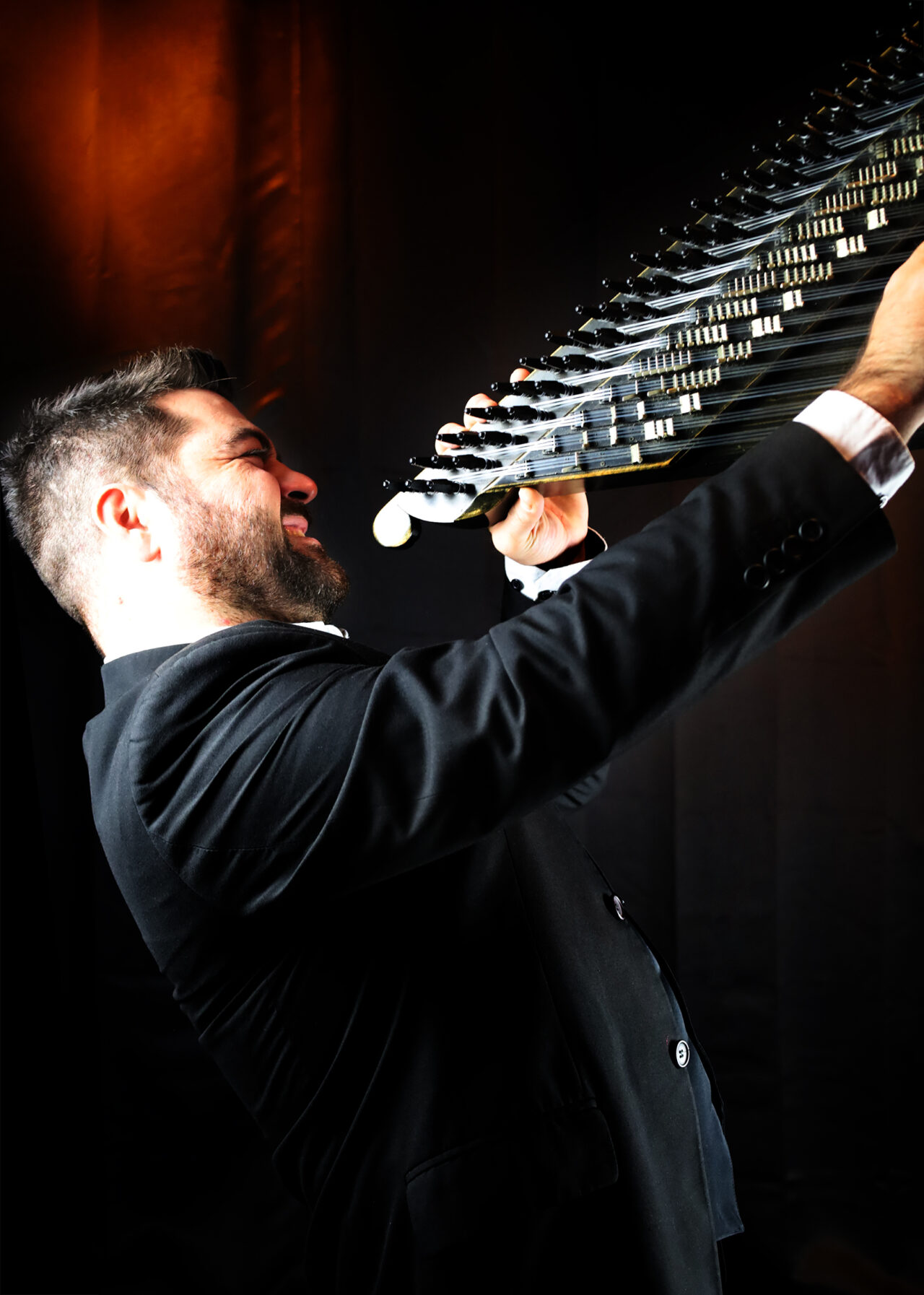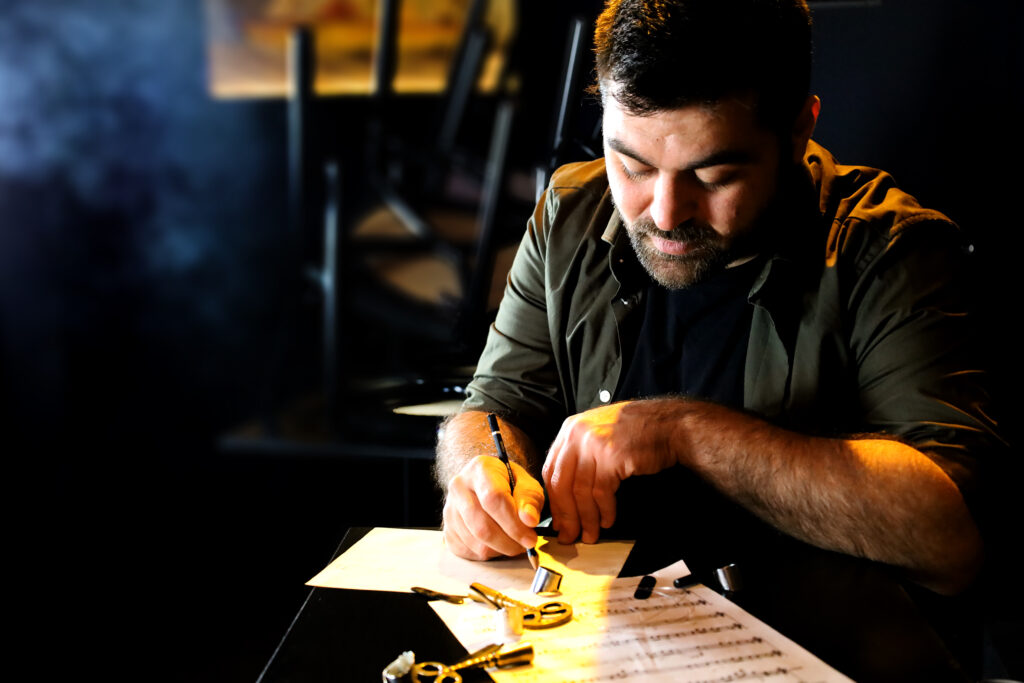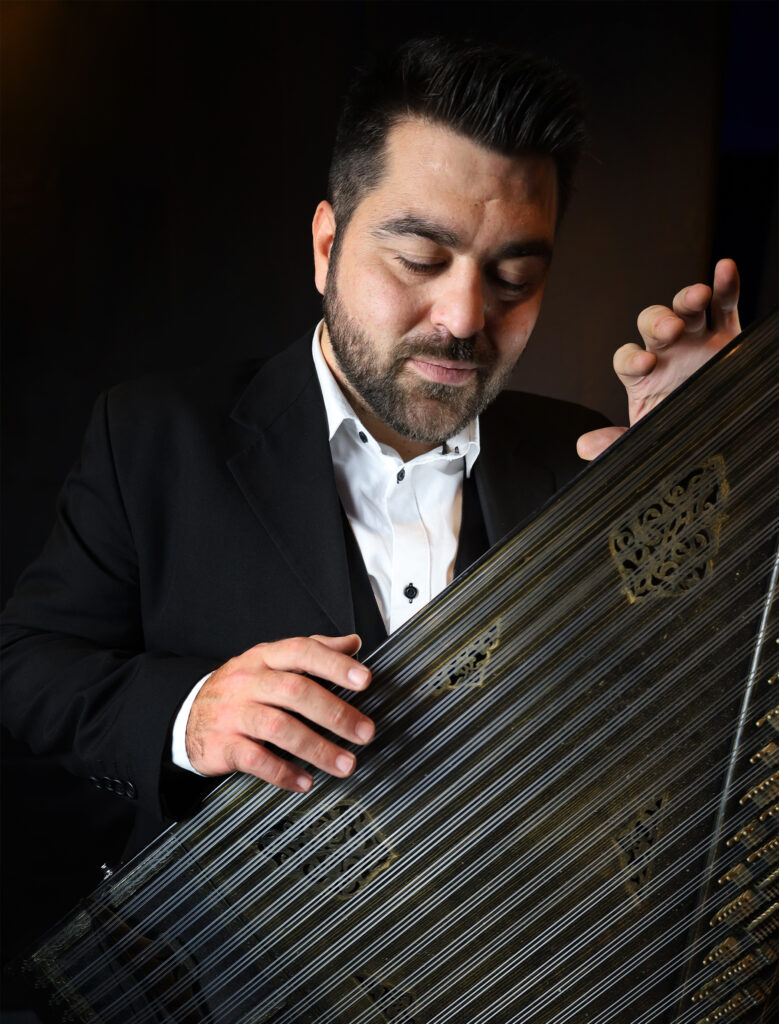
In an interview with The Music Case, Greek qanun soloist Ilias Mantikos talks about the instrument, his inspirations and his upcoming solo qanun album.
-Birthplace: the island of Rhodes
-Currently residing: Athens, Greece
-Your instrument: Qanun (kanonaki)
Can you tell us some impressive facts about your instrument?
I’ll try to be brief so I’ll mention what I consider the most important.
The qanun is predominantly heard in songs and compositions of the east Mediterranean, both traditional and modern in style. However, this instrument lends itself equally well to the genres of other geographical areas, less readily associated with qanun, such as compositions belonging to classical music, fado, flamenco, jazz and more.
It can imitate the sound of various instruments like the guitar, mandolin, glockenspiel, marimba, the harp and so on. Polyphonic melodies can also be played on it relatively easily.
Construction-wise, there are two different versions of the qanun: one played in Greece and Turkey and one played in the Arab world – Egypt, for instance.
Unlike the piano, each note appears twice. For example on the piano, F sharp and G flat are actually the same note whereas on the qanun these are two different notes with a slight tonal difference. This helps a lot in the interpretation of local music idioms, especially when it comes to music of the Balkans and the Mediterranean.
The qanun has 78 strings grouped in 3s and 164 mandals grouped in 6s. The mandals control the intonation of the instrument and help create the microtonal tuning.
This instrument plays a leading part in east mediterranean discography as it has appeared in a significant number of compositions for the last 100 years with numerous notable representatives in Greece, Turkey as well as the Arab World.
The instrument has also been used as an important tool that shaped theoretical systems of east mediterranean music.
As for when and where this instrument originates, opinions conflict. Some believe it comes from the Byzantium where it was known as psaltery while others believe it is derived from a monocord qanun of Pythagoras (Ancient Greece). However, neither of these theories can be proved. Some people struggle with this but for me personally, this mystery surrounding qanun is what makes it even more intriguing.
Mention three or four artists that inspire your sound or whose fans you feel your music would appeal to.
There are many musicians who I’ve been influenced by, some of whom don’t belong to the typical qanun repertoire. Halil Karaduman (qanun), Miles Davis (trumpet), Joe Pass (guitar), Ara Dinkjian (oud), Manos Hatzidakis (composer), Chick Corea (piano), to name but a few. Sorry, but it’s impossible to limit them to 3 or 4 artists.
My compositions are aimed at audiences who are open-minded when it comes to enjoying music, those who don’t focus on the ‘label’ first and then the artist’s work.
I believe that the enjoyment of music should be given centre stage before any categorization or characteristics’ analysis takes place since this enjoyment has nothing to do with the study of music.
When this happens the other way around, we miss the point of its existence. In other words, those who listen to my music will understand that it does not have a typical eastern sound to it. Nor does it clearly stem from the classic jazz repertoire (standards.)
Rather, it is something in between as I try, each time, to fine tune the balance between two genres depending on the central idea. This is the case purely because of my own exposure to music throughout the years. Since I was a child I’ve listened to both traditional Greek music but also other styles such as rock, jazz and classical music.
Finally, my music largely depends on my internal mood and needs I may have at a given time of my life. I can’t dedicate myself only to one kind of music because I believe what’s important that we do is to serve music regardless of its genre since it is music that stays long after we are gone. Surely, the work of an artist who has chosen one specific kind is no less valuable. The above opinion expresses me due to my own personal experience.
Think of the ideal touring partners!
Hahaha, since this is purely hypothetical, I’ll include musicians who are no longer among us but who I’d love to play with. Keyboards Chick Corea, piano Keith Jarrett, trumpet Miles Davis, bass Victor Wooten. This band’s list will never end, I think, so I’ll stop here. However, during this hypothetical concert, there’s a good chance I wouldn’t be able to play a single note as I’d be gazing at them in awe.
But to give you a more realistic answer, my ideal band is the one made up of the fellow musicians I have already chosen to play with since each and every one of them makes a unique contribution to my own music and to music in general.
Who inspired you to become a musician?
My two teachers, of course. Pantelis Anastasopoulos, my first teacher on Rhodes, where I was born and Apostolos Tsardakas, whom I met while I was a student at the university.
I have developed a father-son relationship with both, a relationship which goes beyond that of a teacher-student. I should also mention my family who gave me my first musical experiences. Namely, at the age of 10 I played percussion in an attempt to accompany my father who played amateur bouzouki at parties taking place at our house during various festivities.

Is there a musician you’d like to collaborate with?
Among the musicians who are active today, I’d like to have an opportunity to collaborate with Jacob Collier, Cory Henry, Ara Dinkjian, Sokratis Sinopoulos and others. Needless to say, this list, too, could go on forever as there are so many wonderful musicians in the world I wish I could work with at some point, both on stage and in a studio.
Can you describe your creative process when writing new music?
I usually come up with some rhythmic or melodic idea and then I start developing it either on the qanun or the piano or I simply sing it. Almost at the same time, I draft the basic harmonisation.
After that, I start considering the instruments which could frame the general idea, that is – I visualise the role each instrument would play either in the rhythmic pattern or the melody which may emerge from the initial idea. A critical part of my composing process is the instrument lineup.
Once this process is finished and I have noted down all my thoughts, I leave it aside for a while (for 2 days or so) before I listen to it again. It is at this point that the basic transformation of the arrangement takes place, before the rehearsals start where the final result is created using each musician’s individual sound and way of playing. This is how my initial idea reaches its final shape.
Your last release is about Lullabies for Babies with the Qanun. How did you come up with this idea? What makes it special?
Lately, some of my friends who I used to play music with have started their own families. Babies have inevitably changed their daily routines. We no longer play music as often as we used to and I miss that. Two of my sisters have also had babies. Coming closer to babies, I’ve come to realise how big a deal it is to have the opportunity to get to know a young human being whose character and habits you don’t know well yet but whom you automatically love, like you love their parents whom you do know well and who you have shared many of your experiences with.
“Lullabies for Babies with the Qanun” came out as a sort of a souvenir from this realisation but it’s also my gift to these children who have all the potential to become wonderful people as they emanated from wonderful people – my friends and my sisters.
In this project, I tried to treat the qanun in an untypical way, imitating other instruments such as the mandolin, harp, glockenspiel and even the piano. I wanted to capture my thoughts with very clear, sweet notes, creating this specific mood. Of course, the very instrument helped a lot with its frequencies and timbre so the sound texture of the qanun is also extremely helpful.
I tried to disengage myself from any thoughts which might throw me off the end goal which was none other than to soothe the baby and I hope I’ve succeeded. So, it was a one-take recording as I wanted to stay true to the mood I preset for each track. I kept thinking that it wasn’t an adult who was listening but a child because I believe that only a child is a true listener, deprived of any stereotypes which an adult can bring along when it comes to the enjoyment of music.
Thus, the idea is to “educate” the future listeners, who are less influenced by what music ‘should’ be like. Because, at this stage of their life, children can instinctively understand if what they are listening to is something worthwhile. Growing up, we get confused, not only when it comes to art but on the whole, applying various social boundaries or filters. This thought of mine is very well illustrated in one of D. Savvopoulos’s lyrics: “How can you hide form children when they know it all anyway…”
What would you change in the music industry if you could?
I know that the music industry consists of companies that involve economic benefits. These benefits, more often than not, clash with music itself. Thus, a certain condition is created which an artist has to settle for in order to be able to be a part of a whole. Perhaps it’s worth considering the artists’ real value as seen through their art and not filtered through marketing rules or any other rules, for that matter.
Finally, in this way musicians would be able to talk about their art without risking being ostracised from the rest of the world due to such random rules. These rules sometimes translate to limited music leng and sometimes to off-the-shelf musical arrangements, 15-second intros, for example. If such set lifeless circumstances were debunked, this would bring about a series of changes which would place the artists and their music in a more realistic, stable position in the minds of an average listener.
What’s your favourite book?
I don’t have a favourite book but, lately, I’ve been rereading “The Story of Art” by E. H. Gombrich. Even though this book doesn’t directly concern music, it is very interesting as it chronologically analyses paintings, architecture and sculpture from the early civilizations to more modern movements of the 20th century. However, I love reading poetry but also books of anthropological and social content.
How much time do you spend listening to music a day or a week?
I used to listen to music all day long but I have come to realise that this doesn’t provide me with an analysis of music that derives from clear thinking, which is why I now limit my listening time to 2-3 hours per day. This way I am more relaxed and better prepared to focus on the study of listening itself.
Right now, if you could be anywhere you liked at a blink of an eye, where would that place be?
Lately, I’ve had this desire to find myself in Paris, where I haven’t been before. It’s a city which, apart from being a significant european capital, is completely different from what I’ve known from my home country when it comes to music, architecture, gastronomy and so on.
Of course, it’s not the only city or country I’d like to (re)visit.
What scares you about the future most?
The socio-political circumstances, the way they have shaped Europe and the rest of the world recently, have made the future seem a little more difficult than I’d like it to be in order to achieve everything I want in life.
We have all experienced unprecedented, difficult conditions in the past couple of years and I’m referring to the coronavirus, of course. To top it all off, comes the war in the Ukraine. I find it impossible to stay indifferent to such events and not because of my personal ambitions but because human lives are lost to the advantage of others’.
So, what scares me is that we might not get out of all this unharmed and that many years will have to pass before we can live a healthier, more human-friendly life.
